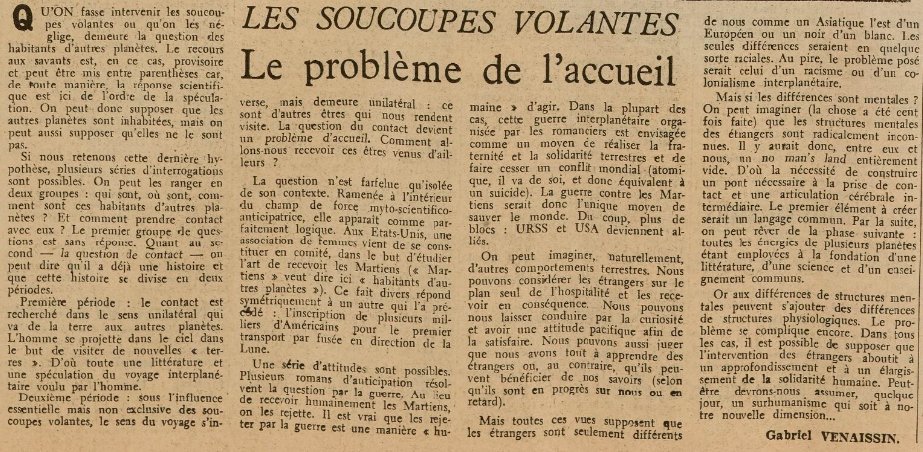The article below was published in the daily newspaper Combat, Paris, France, page 1, le 20 octobre 1954.

|
Whether flying saucers are involved or not, the question of the inhabitants of other planets remains. The involvement of scientists, in this case, is temporary and can be put aside since, in any case, the scientific response here lies in the realm of speculation. One may suppose that other planets are uninhabited, but one may just as well suppose that they are not.
If we accept the latter hypothesis, several lines of inquiry arise.
They can be grouped into two categories: who are they, where are they, and what are these inhabitants of other planets like? And how can we make contact with them? The first group of questions remains unanswered. As for the second - the question of contact - one can say it already has a history, which can be divided into two periods.
First period: contact is sought in the unilateral direction from Earth to other planets. Man projects himself into the sky with the goal of visiting new lands. Hence a whole body of literature and speculation about interplanetary travel initiated by humans.
Second period: under the essential, though not exclusive, influence of flying saucers, the direction of travel is reversed - but remains unilateral: it is other beings who visit us. The question of contact becomes a problem of reception. How will we welcome these beings from elsewhere?
This question is only fanciful when isolated from its context. Brought back within the field of mytho-scientific anticipation, it appears perfectly logical. In the United States, a women’s association has just formed a committee to study the art of receiving Martians ("Martians" here meaning "inhabitants of other planets"). This news item mirrors another that preceded it: the registration of several thousand Americans for the first rocket trip to the Moon.
A range of attitudes is possible. Several works of science fiction resolve the issue through war. Instead of welcoming the Martians humanely, we reject them. It is true that rejecting them through war is a typically "human" reaction. In most cases, this interplanetary war imagined by novelists is seen as a way to establish fraternity and global solidarity, putting an end to a worldwide (atomic, of course, and therefore suicidal) conflict. War against the Martians would thus be the only means of saving the world. As a result, no more blocs: the USSR and the USA become allies.
One can, of course, imagine other Earthly behaviors. We might consider the aliens solely from the perspective of hospitality and welcome them accordingly. We might be led by curiosity and adopt a peaceful attitude in order to satisfy it. We might also believe that we have everything to learn from the aliens - or, conversely, that they might benefit from our knowledge (depending on whether they are more advanced than us or behind).
But all these views assume that the aliens are only different from us as an Asian is from a European, or a Black person from a white person. The only differences would be, so to speak, racial. At worst, the problem would be one of interplanetary racism or colonialism.
But what if the differences are mental? One can imagine (as has been done hundreds of times) that the aliens' mental structures are radically unfamiliar. There would then be, between them and us, an entirely empty no man’s land. Hence the need to build a bridge necessary for contact, and an intermediate cerebral link. The first element to create would be a common language.
From there, one might dream of the next phase: all the energies of several planets employed in founding a shared literature, science, and education system.
Now, to differences in mental structures might be added differences in physiological structures. The problem becomes even more complex. In all cases, it is possible to suppose that the intervention of aliens would lead to a deepening and broadening of human solidarity. And perhaps, one day, we will have to embrace a new kind of superhumanism that matches our new dimension...
Gabriel VENAISSIN